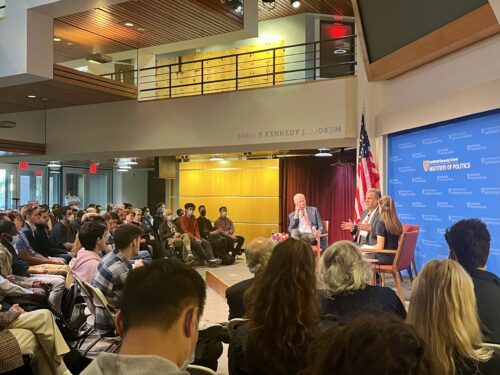Former governor of New Jersey Chris Christie (R) visited the Harvard Kennedy School’s John F. Kennedy Jr. Forum last week, where he opined on why and how voters have declared their elected president illegitimate. Christie reflected on Trump’s presidency and concluded that electoral distrust, or Americans’ unwillingness to accept election results, is the greatest challenge to democracy today. Christie thinks that such distrust stems from the early 2000s and has become a trend of almost two decades.
“My concern for democracy is not gridlock, but an increasing lack of faith in the electoral system that is being jimmied by both political parties,” Christie says. Although Republican sympathizers organized the January 6 capital riots, Christie attributes the sentiments of the mob to a broader loss of faith in the American electoral system. Furthermore, he insists that the Democratic Party catalyzed this phenomenon. Referring to Democrats as the original post-election dissenters, Christie says that “the people who started it own it just as much as the people who continue it [Republicans].”
Christie cites the 2000 election as the first instance in modern history when one party doubted the legitimacy of a president post-election. “As someone who served as one of the lawyers on the Bush team,” Christie says, “the first president to be called illegitimate by the other party was George W. Bush, and that was a line that had not been crossed since the mid-1800s.”
Here, Christie refers to the election of 1876, in which the Supreme Court disputed the legitimacy of Rutherford B. Hayes’ victory due to electoral fraud that had largely occurred in southern states post-Reconstruction. Christie’s statement is factually inaccurate. There have been multiple accusations of electoral fraud between 1876 and 2000. As just one example, President Lyndon B. Johnson was called “Landslide Lyndon,” and the New York Times reported that “there were persistent charges that the election had been fixed.”
It is also notable that the Democrats’ skepticism for Bush in 2001 occured on different grounds: their objections primarily concerned the electoral college rather than voters’ rejection of the president-elect. Furthermore, according to Washington Post polling, Democrats “were less skeptical of Trump in April 2017 than Republicans are of Biden now.”
Christie did address this final disparity regarding electoral distrust: “Trump brought it to a new level.” He admits that the January 6 riots crossed a legal and symbolic line in American politics, and he condemns Trump for failing to intervene. Christie did not endorse the events of January 6, nor does he support Trump. He ultimately acknowledges that “Gore did the right thing” by conceding the election once the legal fight had ended. He also acknowledges that questions over Obama’s legitimacy as a president—especially those claims promoted by Trump—were unfounded.
Christie’s tenure as governor ended and his future political prospects may be grave. Not only has The Fort Lee lane closure scandal followed Christie (it even came up at the Forum), but many still associate Christie with Trump’s presidency. Despite his condemnation of Trump, Christie served as a staunch Republican advisor and coordinator throughout Trump’s election. From his general politics to his views on electoral policy, Christie’s partisanship could hurt him. His plans for 2024 remain to be seen.
LINK TO WEBINAR: https://iop.harvard.edu/forum/conversation-governor-chris-christie-future-republican-party
Mary Cipperman ‘25 (mcipperman@college.harvard.edu) is currently writing a strongly written letter to her representatives about 2024 candidacies.

